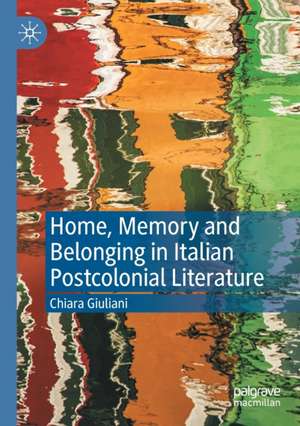Home, Memory and Belonging in Italian Postcolonial Literature
Autor Chiara Giulianien Limba Engleză Paperback – 29 aug 2022
| Toate formatele și edițiile | Preț | Express |
|---|---|---|
| Paperback (1) | 634.00 lei 6-8 săpt. | |
| Springer International Publishing – 29 aug 2022 | 634.00 lei 6-8 săpt. | |
| Hardback (1) | 639.25 lei 6-8 săpt. | |
| Springer International Publishing – 28 aug 2021 | 639.25 lei 6-8 săpt. |
Preț: 634.00 lei
Preț vechi: 745.88 lei
-15% Nou
Puncte Express: 951
Preț estimativ în valută:
121.33€ • 126.51$ • 100.84£
121.33€ • 126.51$ • 100.84£
Carte tipărită la comandă
Livrare economică 20 martie-03 aprilie
Preluare comenzi: 021 569.72.76
Specificații
ISBN-13: 9783030750657
ISBN-10: 3030750655
Pagini: 186
Ilustrații: VIII, 186 p. 1 illus.
Dimensiuni: 148 x 210 mm
Greutate: 0.24 kg
Ediția:1st ed. 2021
Editura: Springer International Publishing
Colecția Palgrave Macmillan
Locul publicării:Cham, Switzerland
ISBN-10: 3030750655
Pagini: 186
Ilustrații: VIII, 186 p. 1 illus.
Dimensiuni: 148 x 210 mm
Greutate: 0.24 kg
Ediția:1st ed. 2021
Editura: Springer International Publishing
Colecția Palgrave Macmillan
Locul publicării:Cham, Switzerland
Cuprins
Chapter 1. Spaces of memory, spaces of belonging: home in postcolonial Italy.- Chapter 2. Termini Train Station: a Place to Arrive, a Place to Leave and to Live.- Chapter 3. The Phone Centre, a Place to Call Home.- Chapter 4. Spaces of Residence and Transnational Microcosms in Postcolonial Italy.- Chapter 5. Rooms as homes: the bathroom and the bedroom as memory containers.- Chapter 6. Conclusion - At home, everywhere.
Notă biografică
Chiara Giuliani is a Lecturer in Italian Studies at University College Cork, Ireland. She researches different aspects of postcolonial literature, questions of home and identity, as well as the cultural representation of the Chinese community in Italy. She has published widely on these topics in different academic journals and books.
Textul de pe ultima copertă
This lucid and finely crafted book explores how migration has made ‘home’ a constantly evolving concept and how practices of home-making can extend through memory and imagination to include spaces as diverse as the call centre and the train station. Providing detailed new readings of a range of postcolonial texts in Italian, this book will be essential reading for all scholars and students who engage with cultural representations of migration.
– Emma Bond, Reader, University of St Andrews, Scotland
This is an inspirational book that provides a compelling analysis of how migration literature negotiates and reconceives notions of home. Giuliani brilliantly explores how domestic and public spaces are reconfigured in postcolonial literature, allowing us to grasp the complexity of the lived experiences of migrants. Giuliani’s engaging work offers an innovative perspective on migration culture; an essential reading for anyone interested in Postcolonial, Memory and Space Studies.
– Simone Brioni, Associate Professor, Stony Brook University, USA
This book examines the meaning of home through the investigation of a series of public and private spaces recurrent in Italian postcolonial literature. The chapters, by considering Termini train station in Rome, phone centres, the condominium, and the private spaces of the bathroom and the bedroom, investigate how migrant characters inhabit those places and turn them into familiar spaces of belonging. Home, Memory and Belonging in Italian Postcolonial Literature suggests “home spaces” as a lens to examine these places and the practices enacted by their inhabitants to feel at home. Drawing on a wide array of sources, this book focuses on the role played by memory in creating transnational connections between present and past locations and on how these connections shape migrants’ sense of self and migrants’ identity.Dr Chiara Giuliani is Lecturer in Italian Studies at University College Cork (Ireland). She researches different aspects of postcolonial literature, questions of home and identity, as well as the cultural representation of the Chinese community in Italy. She has published widely on these topics in academic journals and books.
– Emma Bond, Reader, University of St Andrews, Scotland
This is an inspirational book that provides a compelling analysis of how migration literature negotiates and reconceives notions of home. Giuliani brilliantly explores how domestic and public spaces are reconfigured in postcolonial literature, allowing us to grasp the complexity of the lived experiences of migrants. Giuliani’s engaging work offers an innovative perspective on migration culture; an essential reading for anyone interested in Postcolonial, Memory and Space Studies.
– Simone Brioni, Associate Professor, Stony Brook University, USA
This book examines the meaning of home through the investigation of a series of public and private spaces recurrent in Italian postcolonial literature. The chapters, by considering Termini train station in Rome, phone centres, the condominium, and the private spaces of the bathroom and the bedroom, investigate how migrant characters inhabit those places and turn them into familiar spaces of belonging. Home, Memory and Belonging in Italian Postcolonial Literature suggests “home spaces” as a lens to examine these places and the practices enacted by their inhabitants to feel at home. Drawing on a wide array of sources, this book focuses on the role played by memory in creating transnational connections between present and past locations and on how these connections shape migrants’ sense of self and migrants’ identity.Dr Chiara Giuliani is Lecturer in Italian Studies at University College Cork (Ireland). She researches different aspects of postcolonial literature, questions of home and identity, as well as the cultural representation of the Chinese community in Italy. She has published widely on these topics in academic journals and books.
Caracteristici
Examines the ways in which migrant characters use space in order to establish new forms of belonging in Italian postcolonial society Suggests a new understanding of the idea of home in the context of migration, which allows for the creation of multiple home spaces Explores a wide range of literary and journalistic sources to analyse a series of public and private spaces used by migrants in Italy
